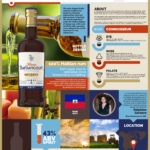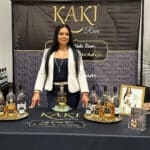Owner & CEO of Rhum Barbancourt: DELPHINE GARDERE
For over 160 years, the Rhum Barbancourt distillery has been passing on its unique know-how, inherited from its founder, Dupré Barbancourt, from generation to generation to refine the Barbancourt style. In the 1950s, Jean Gardère gave an additional dimension to the estate through industrialization while his son, Thierry Gardère, increased production capacity. His granddaughter, Delphine Gardère, current guardian, has inspired a more modern and international dimension to the distillery and the brand.
TRL: Who is Delphine Gardere?
I am the CEO of Société du Rhum Barbancourt and the fifth generation Gardère family member to oversee Haiti’s oldest rum company. I was raised in Haiti and attended college in France, where I received a degree in business at the INSEEC Grande Ecole Paris, and later attended Emory University in Atlanta. After graduating, I worked in finance and investment as a stock analyst in London and later pursued a master’s degree in marketing from the Cranfield School of Management in the UK before working as a marketer in the fragrance industry.
In 2016, when I realized that my passion was in consumer products and my heart was in my family business, I returned to Haiti to craft a plan for premiumization, expansion of distribution, and export growth for Rhum Barbancourt. When my father passed away in March 2017, I assumed the responsibility for upholding Barbancourt’s over 160-year legacy as the second woman in my family lineage to lead the distillery.
TRL: What does the rum mean to you? What made you fall in love with rum and when did it happen?
I feel like rum is part of my DNA! It is a distilled spirit with a rich and storied history that includes pirates (the famous buccaneer island of Tortuga is off the coast of Haiti) to social rituals. Additionally, since I grew up around the manufacturing side of rum, it is a product that conjures up a lot of memories and milestones in my life.
TRL: Three essential characteristics that define the rum according to your perspective.
For me, the three characteristics that define a rum are its base ingredient (sugarcane), the distillation process, and aging (at Barbancourt we age our rum in oak casks). Three words that describe Barbancourt are Haitian, Escapism, and Quality.
TRL: What is the most important contribution you have made to the rum industry?
In my work and travel, I advocate for Haitian rum on the global stage, while also ensuring that Rhum Barbancourt maintains its position as one of the finest rums in the industry. While at the Cranfield School of Management in the UK, I wrote my thesis on the premiumization of rum and later brought that theory to life at Barbancourt. I also try to elevate the perception of Haiti by constantly showcasing our award-winning rum selections that celebrate our excellence in craftsmanship, flavor and shared enjoyment that embody the heart and soul of Haiti. Most of all, I advocate for greater inclusion of women in our industry with a nearly 50% increase in female hires at the Barbancourt distillery in the last 4 years, from administration to quality control, operations, and maintenance.
TRL: Benefits that the rum industry has given you.
As a rum producer in Haiti, we’ve been able to create a road map to help businesses that Barbancourt works with grow and professionalize their operations, especially the ecosystem of sugarcane farmers who provide us with the first ingredient for our award-winning rums. The ability to lift other people and industries as we grow as a company has been an amazing byproduct of my time in the rum industry. I am grateful for it.
TRL: What’s another thing you are passionate about, in addition to rum? Why?
I spend a lot of time reading about interior design, real estate, and the luxury goods industry. Those are my passions!
TRL: What is your favorite place for drinking rum?
With friends – evenings during cocktail hour or the weekend at the pool or the beach. It’s a spirit that brings people together in different ways, whether casually or on a rooftop bar with cocktails. Rum brings us together.
TRL: Favorite drink + Recipe
I’ve been enjoying Rhum Barbancourt on the rocks recently, particularly the 5*, 8-year. I also love our local signature rum sour or a Frozen Daiquiri with the 3* or Haitian Proof (our latest overproof white rum).
TRL: Why is it important to educate the rum consumer?
Rum has a particularity that it is extremely versatile: molasses, pure juice or syrup. There are also distinct production methods that distinguish different rums. The individual craftsmanship in the industry is important and can vary even on the same island.
TRL: Any tips to train the palate and taste good premium rum?
There are a few things, but the most important is to be mindful so that you can engage all your senses during the experience. The glassware also matters, and I recommend taking small sips so as not to overload your palate.
TRL: How can the rum contribute to improving the crisis in some countries?
Through the auspices of the Barbancourt Foundation, we take a holistic approach to growth and prosperity in Haiti and promote the well-being of the entire community by bolstering communal health and welfare with bold initiatives in healthcare, education, youth sports, arts, and culture year-round.
Over the last three years, the Barbancourt Foundation has built out a standalone health clinic that provides services not only for distillery workers’ families but also to the adjacent community. The clinic treats 800 patients per month on average.
We have also supported local education initiatives including funding educational programs, sports youth programs, and scholarships (Haitian Educational and Leadership Program) to keep the youth safe and off the streets and to contribute to building a skilled workforce in Haiti that benefits the entire community.
TRL: Is the commitment to sustainable development the key of success for the permanence of the rum industry in the world? Why?
The commitment to sustainable development is key to the permanence of the rum industry, especially in Haiti. Since the time my father managed Rhum Barbancourt, we have been working on our energy independence. We started by using our bagasse, a byproduct of sugarcane processing, as a renewable energy source through co-generation technology, to reduce the carbon footprint of our rum production.
Most recently, as our operations expand, we are installing a large solar field, funded by the International Development Bank (IDB), to generate electricity. This will reduce our dependence on generators, which are subject to supply disruptions, and will also help us reduce our carbon footprint.
Finally, we plan on opening a recycling plant with a bottle return program for the local market, which will reduce our environmental impact, conserve resources, and save costs.
TRL: What are your next goals in the rum industry?
Over the last few years, we have been very focused on strengthening our brand identity, crafting premium offerings, and expanding market reach. The next few years will be a continuation of the same with new releases that showcase our craftsmanship, but we will also improve our sustainability profile with our new projects in collaboration with the IDB.
TRL: Plans you have when you leave the rum industry.
I don’t plan on leaving. If I do, it will be for my retirement.
TRL: Why is the role of the bartender important in the rum industry?
Bartenders are key to introducing new products and making recommendations. They act as ambassadors and educate consumers about the history, production process, and the qualities of different rums. They can also influence demand by creating trends.
They are also key to providing feedback to producers on consumer preferences and trends. Lastly, they’re so creative and fun!
TRL: What is your advice for new generations in the rum industry?
The one advice I can give is to understand and learn the history and craft behind rum production. This gives you an appreciation for the product. Sometimes, you need to understand the past to move forward effectively.
TRL: How can people learn more about you? Website? Social media page?
About The Author
Creative Director for EmpresasFH and Director of HOFFMANNdesign. Born and raised in Caracas, Venezuela, Mr. Hoffmann has been one of the most important designers for prestigious companies in South America, including Disney, Cartoon Network, Mattel among others.





